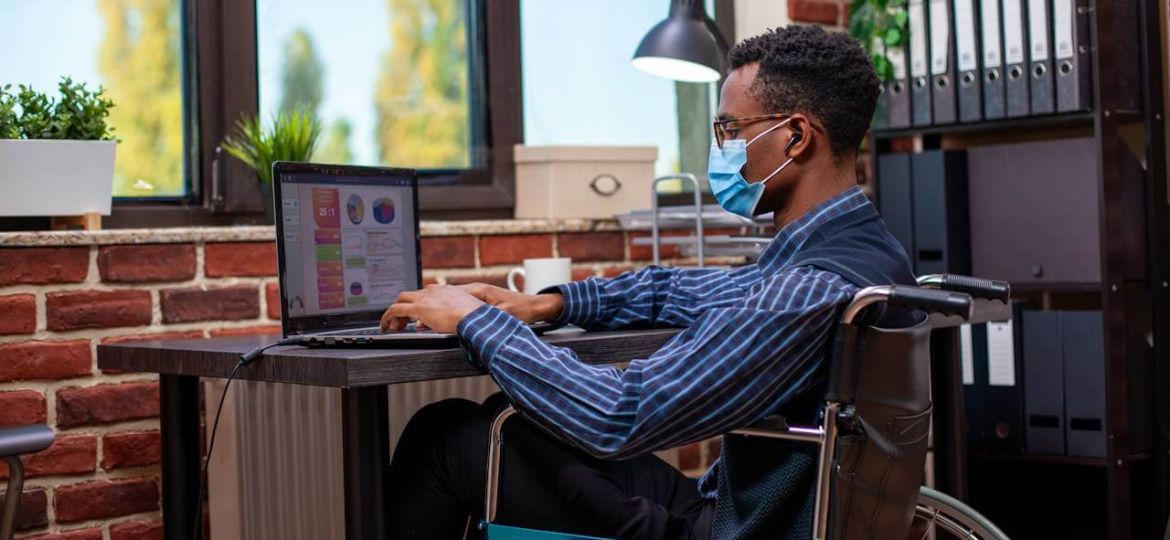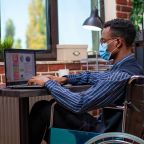According to the National Skills Fund Strategic Plan 2025 -2030, only 7% of businesses are owned by people living with disabilities. The main aim of the National Skills Strategic Plan is to increase the high quality, educational training and skills development opportunities, to not only reduce inequalities but also to allow better participation in the South African Economy.
It is estimated that 1% of the total working force is persons who are differently abled, in the South African sphere. This is especially concerning as people with disability make up between 8% and 11% of the population, and women have it way harder in this regard. Training at early stages is then crucial for disabled individuals, hence why The Skills Development Corporation is impactful in our society.
The Skills Development Corporation recognizes that the best way to support the persons living with disability is through individual empowerment. From our recruitment phase our learnership programs are created with the purpose of setting the differently abled learner for success via the vetting process all the way through to our classroom facilitators who show up daily as not only facilitators but also mentors that are well versed in the psychology of disabilities & independence.
By promoting disability inclusion in learnerships, we’re helping to:
- Bridge the skills gap for people with disabilities
- Empower individuals to enter the workforce with confidence
- Encourage companies to embrace diversity as a strength
Induction and Orientation Introduction
Right from the beginning at Induction phase, when our learners are signing their contracts and introduced to who their sponsors are and right before they begin with their workplace-experience, we are purposeful about workplace norms and expectations. We cover basics such as communication both in the classroom with their peers or facilitators, we cover teamwork & time management. This stage allows us to note any insight to which learners will need special attention if they are differently abled. For example most of our learners are coming from impoverished & less privileged backgrounds, therefore communication literacy is commonly a problem, as they might not have had exposure to English as most learners who would have gone to normal schools.
All-Abilities Learning Environment
We provide learners who are differently abled the right support staff to meet their learning needs, such as scriber upon request if a learner is unable to write for themselves in the classroom. If a learner is physically disabled, a wheelchair-accessible training venue & restroom is provided for. With a lift from the first floor up to the second, our campus is designed to cater to the safety needs of disabled learners.
People Skills and Wellness Support
SDC provides access to counselling or assistance programs for learners who might be facing personal challenges daily on campus. The program from Sadag assist learners who are facing mental health issues and even imposter syndrome, or other life pressures. We are serious about having an inclusive approach where we support learners and improve their ability to learn and at the end perform what they have learned.
Monitoring and Feedback
Weekly evaluations are given to all our learners, due to the course framework, but additionally we have ensured the system where the facilitator treats each learner with application to the individualistic unique support that they need. We adapt out guidance and mentoring when dealing with learners, to meet their special needs, helping learners succeed in the best way that works for them. The aim with monitoring and feedback is to continue doing research in order to better understand the challenges that our learners face on a daily basis. We also intend to find out areas that a learner could be struggling with and provide professional support there and then. In order for the learner to be successful in their learning objectives, in order for the 30% theory to be successful, as well as the 70% workplace experience to be conducted properly, these high completion rate figures definitely require a hands-on approach, very supportive approach instead of trial-by-fire approach.
Conclusion
Our learners thrive at their studies due to the support they have from their facilitators that assist them during contact, practical and workplace simulations for their program. At our organization we live by our slogan “We are the difference”, by fostering an inclusive culture that appreciates diversity whilst promoting mutual respect, not only with our employees but as well as our learners. We’ve always been intentional with training our facilitators to understand the importance of diverse backgrounds and ensuring they are equipped with all the resources they need to support persons living with disabilities. Our inclusive work culture encourages learners to be themselves, gain confidence in their unique abilities moreso adding a huge amount of self-asteem. Our ability to place learners in learnerships not only adds points to your company’s generic scorecard but additionally these programs the learners complete also serve as a 12 month screening process, call it a twelve month interview allowing the evaluation of candidates potential and seeing if they’d be a good fit for with the organization. SDC has always been passionate about addressing the employment issue in South Africa, by directly being impactful through learnerships, by providing life-changing learnership opportunities for all young people and looks forward to sharing the knowledge with companies that champion PWD within their workforce. We look forward to uplifting the youth, ensuring that the amended Employment Equity legislation, addressing the inclusion of persons living with disabilities in the workplace takes a priority.
Referencing :
National Skills Fund Strategic Plan (2025). Available at:
https://static.pmg.org.za/NSF_SP_2025_TO_2030_27_March_2025.pdf.
Accredited Skills Development For Persons Living With Disabilities (2021) Transcend.co.za. Available at:
https://www.transcend.co.za/learn/accredited-skills-development-persons-with-disabilities# (Accessed: 10 October 2025).










